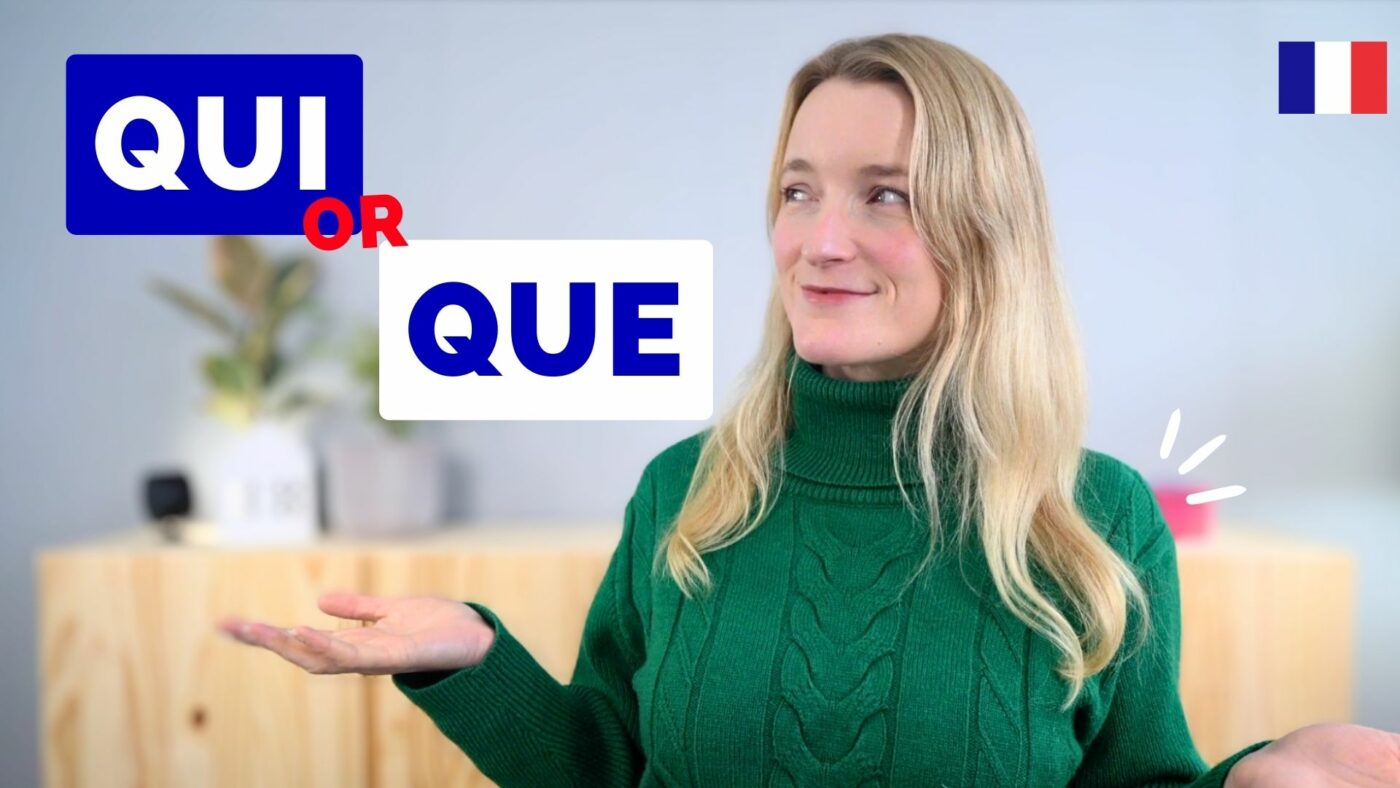Menu
Close
QUI vs QUE explained!
QUI and QUE are French relative pronouns (pronoms relatifs). They are used to link clauses (two parts of the sentence).
In this French lesson, you are going to learn how and when to use QUI vs QUE, as well as do a little bit of practice with the free worksheet to download.
The PDF includes an interactive French test. Leave your email in the form below to download your PDF with the interactive French Test.

Relative pronouns, les pronoms relatifs in French, link the main clause to the relative clause.
French has 5 relative pronouns: que – qui – dont –où – lequel, but today we are going to focus on qui and que.
In English, they can be translated to: who – which – that – whom – where. But the biggest difference between English and French is that in English, they are sometimes skipped, but not in French!
Qui replaces the subject and can be translated to who, which, or that. The subject can be a person or a thing.
Qui can never be qu’ in front of a vowel.
=> Use qui when followed by a verb or a pronoun (reflexive pronoun – direct object pronoun – indirect object pronoun)
French reflexive pronouns | French direct object pronouns | French indirect object pronouns |
me | me | me |
te | te | te |
se | le – la | lui |
nous | nous | nous |
vous | vous | vous |
se | les | leur |
Il a une voiture. Sa voiture est vieille.
He has a car. His car is old.
Il a une voiture qui est vieille.
He has a car that is old.
Elle a une amie. Son amie est actrice.
She has a friend. Her friend is an actress.
Elle a une amie qui est actrice.
She has a friend who is an actress.
Que replaces the direct object and can be translated to who, whom, which, or that. Que becomes qu’ when placed before a word starting with a vowel or a silent h.
Que is always followed by a subject pronoun or a noun, but not a verb.
French subject pronouns
Je
Tu
Il – Elle – On
Nous
Vous
Ils – Elles
=> Use que when followed by a noun or a subject pronoun.
J’ai commandé un café. Il est trop chaud.
I ordered a coffee. It’s too hot.
Le café que j’ai commandé est trop chaud.
The coffee I ordered is too hot.
Je veux un livre. Il n’est plus disponible.
I want a book. It is no longer available.
Le livre que je veux n’est plus disponible.
The book I want is no longer available.
When the following verb is conjugated in the passé composé with avoir, the past participle agrees with the relative pronoun.
Tu m’as raconté une histoire. Elle est fausse.
You told me a story. It is wrong.
L’histoire que tu m’as racontée est fausse.
The story you told me is wrong.
1. J’ai des amis _________ seront là ce soir.
I have friends who will be there tonight.
2. La personne _________ a appelé a laissé un message.
The person who called left a message.
3. Le chien _________ j’ai adopté est adorable.
The dog I adopted is adorable.
4. C’est la chanson _________ j’adore.
This is the song that I love.
5. Le chaton _________ a été adopté est roux.
The kitten that was adopted is red.
6. Elle mange le gâteau _________ tu as acheté.
She is eating the cake you bought.
7. C’est le portefeuille _________ j’ai perdu.
This is the wallet I lost.
8. Je vais prendre le train _________ part à 9 heures.
I’m going to take the train which leaves at 9 o’clock.
9. Ma voisine a un chat _________ s’appelle Fifi
My neighbor has a cat called Fifi.
10. C’est toi _________ as éteint la lampe ?
Did you turn off the lamp?
If you prefer to watch a video lesson, you can watch the video When to Use QUI vs QUE in French.

2 Responses
Le “French Learning Challenge” est super. J’ai une question à propos de la phrase ci-desous:
“Elle a une amie. Son amie est actrice.”
Pourquoi est-ce qu’on utilise son?
Merci pour votre response.
Son = Her/His – Her in this case 😉